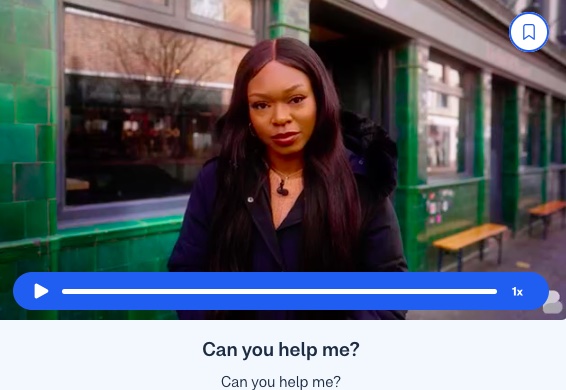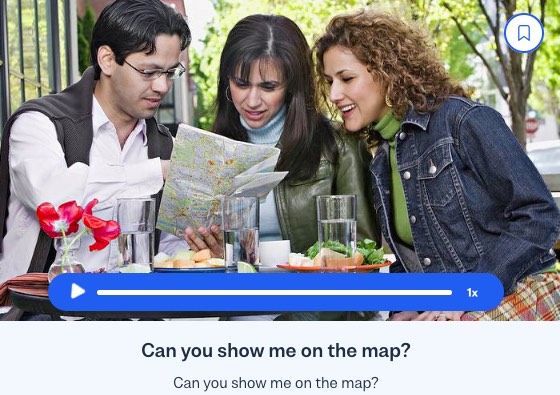The 6 Best Ways to Learn a Language While Traveling
Discover some tips and recommendations on learning a new language while you travel.
I want to learn...
Traveling is awesome. But traveling and communicating properly with the locals is even better. Luckily, there’s no better way to learn a language than in its country and with native speakers.
Sure, you could spend your trip sightseeing, eating, drinking, and trying to cram every single Instagrammable thing in. But, if you take a step back, you’ll see that learning a language as you travel leads to a more meaningful experience.
Here are the six best ways to learn a language while you travel.
1. Get off the beaten track
Most countries with a tourism industry also have decent English. For example, you can travel around Thailand without needing a word of Thai (as long as you stick to the tourist trail). But to really show your language chops, you need to go where people don’t speak your language.
This doesn’t mean you can’t still hit the big sites. Of course, you can. But if you mix in some rural places or restaurants aimed at locals, you get a chance to immerse yourself in the language.
When I was backpacking around Vietnam, I did a homestay with a family way out in the sticks. We cooked together (delicious homemade spring rolls). We ate together. And we chatted.
The thing is, only the father of the family spoke English. And he wasn’t around much. The mother and kids of the family taught us how to make spring rolls with a mixture of Vietnamese and hand gestures. It was awesome. We had so much fun away from the English-speaking tourism bubble.
If you want those authentic experiences (that can help your language learning), get away from the tourist traps.
2. Mix with the locals
It’s too easy to go traveling and spend the whole trip with your friends, or people from your country (especially if you go on a packaged tour). But if you want to smash your language goals, this won’t do. You need to meet local people in local places and speak the local lingo.
So put yourself out there. Have courage and talk with as many people as possible. Don’t worry about looking stupid. Sure, you’ll make mistakes. But you’ll soon realize how much people love it when you make a big effort to communicate with them.
3. Consider a work exchange
Here’s another great way to learn a language (and earn or save some money) while you’re traveling. You can offer to work for a local business in exchange for something.
My friend volunteered to work at a dive shop in the Philippines. She got to dive for free. And as English was the language they used at work, she improved her English. In return, she helped out with customers from her country. Win-win for everyone.
4. Go it alone
Traveling alone is a fantastic way to practice a language. Granted, it’s daunting when you first do it — I was terrified when I set out for the Philippines on my own. But when you get used to it and know how to keep yourself safe, it’s a great experience.
You become the boss of your trip. You can go wherever you want, whenever you want. You don’t need to compromise on your experiences. And you get tons of time to practice your new language.
Here’s the thing, I’ve spent lots of time traveling with my best friends. It’s always great fun. But we have routines we’ve built over years and years of friendship. It’s easy to fall into those routines — we talk about the same things we always talk about, or we do things that we always do. And, obviously, we do it in our native language.
I love my friends of course. But to guarantee that you have new and unique adventures when you’re traveling, go solo. You can do what you want. And you have no reason not to use your new language 100%.
5. Do your hobbies
The last two tips were pretty extreme — not everyone can do a work exchange. And not everyone’s comfortable traveling alone. But anyone can do this next tip: Do your hobbies. That’s it. Simple.
Do you play soccer every weekend back home? Well, try and join a pick-up game in the park at your destination. Or maybe you’re a yogi? There are yoga classes all over the world for you to join.
Don’t get me wrong, sightseeing is great. But taking an hour or two each day to continue your hobbies when you’re traveling can help you learn the language. There are two big reasons it’s great for language learning:
-
The other people doing the hobby likely won’t speak your language. So you get to follow along to a yoga class in Spanish for a change. It’s a great opportunity to immerse yourself in your new language.
-
You already understand the context. You regularly do your hobby. You have loads of background knowledge and experience. So even if the language is different, you know what’s going on. This can really help you understand new vocabulary or grammar from context.
So if you want to learn a language while you’re traveling, do what you love. But do it with new people and in a different language.
6. Keep studying (but just a little)
You’ve got better things to do on vacation than studying. I know that. Everyone knows that. But 10 minutes of language study per day is better than nothing. And it doesn’t get in the way of all the fun.
Here are some more ways to keep your study habits going on your trip:
-
Read graded readers. Reading novels in your new language is tough unless you’re at an advanced level. That’s where graded readers come in. They’re simplified for language learners so even beginners can read them. And they’re perfect for reading in airports, on transport, or at the beach.
-
Memorize vocabulary. Vocabulary flashcards or apps are a great way to kill some time and practice your new language. Squeeze this practice in as you’re waiting for a taxi or enjoying your morning coffee.
-
Write in your journal (in your new language). Another activity that you can fit into your busy vacation day is writing in your journal. In your new language, of course. This can be as simple or as complicated as you like. For example, you could write about the previous day — where you went and what you did. Or if you want a bigger challenge, you can reflect on some language issues you had.
-
Use Busuu. Busuu’s smart vocabulary and grammar review tool is perfect for a quick study session. You’ll know what you’ve learned and what you're still struggling with. Busuu then uses this information to tailor quizzes for your needs. Another perfect short study activity when traveling.
7. Do immersion reading
Traveling includes some long journeys. What if you could combine entertainment, killing time, and learning into one effective activity to do on those long, boring journeys? Well, you can. Say hello to immersion reading.
Immersion reading is when you read a story and listen to the audiobook at the same time. Everyone knows reading and listening are great ways to learn a new language. Not many people know how powerful it can be to do them both at the same time though. Research shows that reading and listening is more effective than just reading (or just listening).
It is great when traveling too. You read and listen to a book in the language of your destination. You learn some language. And you get an understanding of the culture. You also get some possible conversation topics to chat with the locals about. It’s a win-win.
Take advantage of language-learning opportunities when you travel
Here’s the thing: The more you communicate with people when you’re overseas, the better your experience will be. Luckily, learning a language while traveling doesn’t need to be a grind. An hour here or there is plenty. And it’s not rocket science — use a language-learning app, show everyone how brave you are, and do the things you love to do. You’ll see your language skills go through the roof and (most importantly) your overseas trip will be more meaningful.
Speak like the locals, with the locals
With Busuu you get feedback from native speakers, complete free courses made by language-learning experts, and join a community of millions of language learners. And best of all, you can do it all on a mobile device. It doesn’t matter if you’re on a beach in Bali, getting pizza in Naples, or at home on the couch.
You might also like...
Benefits and importance of bilingual education
How polyglots learn languages
The benefits and importance of multilingualism
6 best jobs for language lovers
5 reasons why learning a foreign language can fast-track your career
The 8 best languages to learn for international business
Benefits of learning a foreign language for students
Foreign language requirements for colleges

